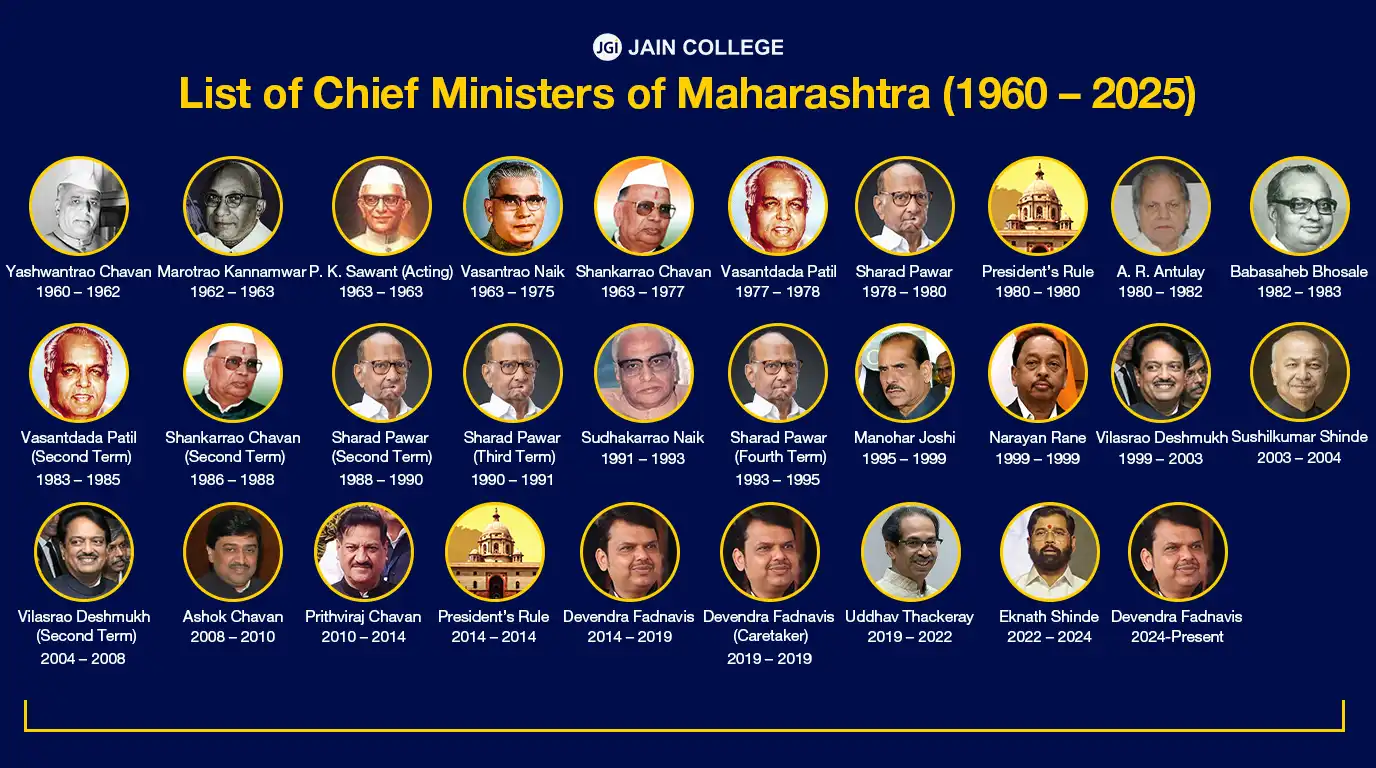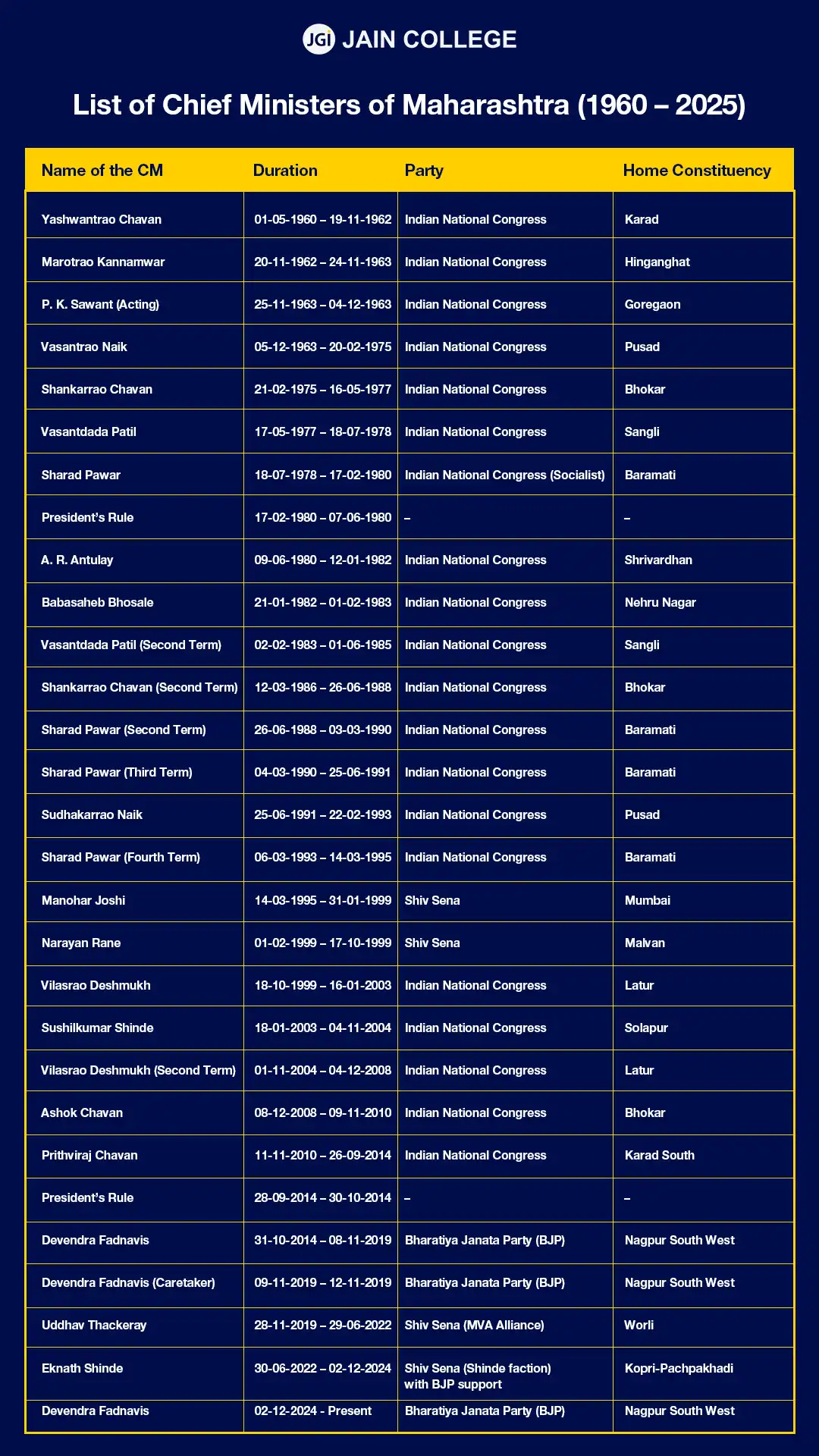
| Name of the CM | Duration | Party | Home Constituency |
| Dhanjishah Cooper | 1 April 1937 – 19 July 1937 | Independent | - |
| Balasaheb Gangadhar Kher | 19 July 1937 – 2 November 1939 | Indian National Congress | - |
| Vacant (2 November 1939 - 30 March 1946) | |||
| Balasaheb Gangadhar Kher | 30 March 1946 – 26 January 1950 | Indian National Congress | - |
| Chief ministers of Bombay State (1947–60) | |||
| Balasaheb Gangadhar Kher | 15 August 1947 –21 April 1952 | Indian National Congress | MLC |
| Morarji Desai | 21 April 1952 –31 October 1956 | Bulsar Chikhli | |
| Chief ministers of Bombay State (1956–60) | |||
| Yashwantrao Chavan | 1 November 1956 –5 April 1957 | Indian National Congress | Karad |
| Yashwantrao Chavan | 5 April 1957 –30 April 1960 | Karad | |
| Chief ministers of Maharashtra (1960–present) | |||
| Yashwantrao Chavan | 1 May 1960 –20 November 1962 | Indian National Congress | Karad |
| Marotrao Kannamwar | 20 November 1962 –24 November 1963[†] | Hinganghat | |
| P. K. Sawant | 25 November 1963 – 5 December 1963 | Goregaon | |
| Vasantrao Naik | 5 December 1963 –1 March 1967 | Pusad | |
| Vasantrao Naik | 1 March 1967 – 13 March 1972 | ||
| Vasantrao Naik | 13 March 1967 – 21 February 1972 | ||
| Shankarrao Chavan | 21 February 1975 –17 May 1977 | Bhokar | |
| Vasantdada Patil | 17 May 1977 –5 March 1978 | Indian National Congress (U) | Sangli |
| Vasantdada Patil | 5 March 1978 –18 July 1978 | ||
| Sharad Pawar Baramati | 18 July 1978 –17 February 1980 | Indian Congress (Socialist) | Baramati |
| Vacant (17 February 1980 - 8 June 1980) | |||
| A. R. Antulay | 9 June 1980 – 21 January 1982 | Indian National Congress | Shrivardhan |
| Babasaheb Bhosale | 21 January 1982 – 2 February 1983 | Nehru Nagar | |
| Vasantdada Patil | 2 February 1983 – 3 June 1985 | Sangli | |
| Shivajirao Patil Nilangekar | 3 June 1985 – 12 March 1986 | Baramati | |
| Shankarrao Chavan | 12 March 1986 – 26 June 1988 | Bhokar | |
| Sharad Pawar Baramati | 26 June 1988 – 4 March 1990 | Baramati | |
| Sharad Pawar Baramati | 4 March 1990 – 25 June 1991 | ||
| Sudhakarrao Naik | 25 June 1991 – 6 March 1993 | Pusad | |
| Sharad Pawar Baramati | 6 March 1993[§]– 14 March 1995 | Baramati | |
| Manohar Joshi | 14 March 1995 –1 February 1999 | Shiv Sena | Mumbai |
| Narayan Rane | 1 February 1999 –18 October 1999 | Malvan | |
| Vilasrao Deshmukh | 18 October 1999 – 18 January 2003 | Indian National Congress | Latur |
| Sushilkumar Shinde | 18 January 2003 –1 November 2004 | Solapur | |
| Vilasrao Deshmukh | 1 November – 2004[§]8 December 2008 | Latur | |
| Ashok Chavan | 8 December 20087 November 2009 | Bhokar | |
| Ashok Chavan | 7 November 200911 November 2010 | Bhokar | |
| Prithviraj Chavan | 11 November 201028 September 2014 | Karad South | |
| Vacant (28 September 2014 - 30 October 2014) | |||
| Devendra Fadnavis | 31 October 201412 November 2019 | Bharatiya Janata Party | Nagpur South West |
| Vacant (12 November 2019 - 23 November 2019) | |||
| Devendra Fadnavis | 23 November 201928 November 2019 | Bharatiya Janata Party | Nagpur South West |
| Uddhav Thackeray | 28 November 201930 June 2022 | Shiv Sena | Worli |
| Eknath Shinde | 30 June 20225 December 2024 | Kopri-Pachpakhadi | |
| Devendra Fadnavis | 5 December 2024 - Present | Bharatiya Janata Party | Nagpur South West |
Note:
[†] Died in office
[RES] Resigned
[§] Returned to office after a previous non-consecutive term

Notes:
The first Chief Minister of Maharashtra, Yashwantrao Chavan is remembered as the “architect of modern Maharashtra.” A strong Congress leader, he worked for industrialisation, irrigation projects, and cooperative movements, particularly in sugar production. Later, he rose to hold key Union Cabinet positions, including Defence Minister and Finance Minister.
A Congress leader from Vidarbha, Kannamwar focused on rural development and irrigation schemes during his brief tenure. His government emphasised improving agricultural productivity and strengthening cooperative institutions.
After Kannamwar’s sudden demise, P. K. Sawant served briefly as caretaker CM. His short tenure mainly ensured continuity of governance before a new leadership was elected.
The longest-serving CM of Maharashtra (12 years), Naik is credited with stabilising the cooperative sector, expanding irrigation, and promoting agricultural reforms. He played a major role in the Green Revolution in the state, ensuring Maharashtra became a leader in cotton and sugarcane production.
Chavan focused on law and order during politically turbulent times. He later became Union Home Minister. His pragmatic leadership helped Maharashtra navigate the challenges of the Emergency period.
Known as the “Lord of the Cooperatives,” Patil was instrumental in strengthening Maharashtra’s sugar cooperatives. He worked extensively to support farmers and expand educational institutions across rural Maharashtra.
One of Maharashtra’s tallest leaders, Pawar first became CM at just 38. His terms were marked by industrial expansion, irrigation development, and political manoeuvring. Founder of the NCP, he remains a dominant figure in Maharashtra politics even today.
The first Muslim CM of Maharashtra, Antulay is remembered for initiating housing schemes for weaker sections. His tenure, however, was marred by the “cement scandal,” which forced his resignation.
Bhosale’s brief term focused on administrative efficiency. Though not very politically prominent, he maintained stability after Antulay’s resignation.
As CM during the 1992–93 Bombay riots, Naik faced criticism for failing to maintain communal harmony. Despite this, he introduced several agricultural and cooperative reforms, aiming to uplift rural Maharashtra.
The first Shiv Sena CM, Joshi’s government came to power in alliance with the BJP. His tenure saw infrastructure projects in Mumbai and promotion of Marathi pride. The period also marked a shift from Congress dominance to regional party governance.
A Shiv Sena leader, Rane served only for a few months. He focused on law and order and urban development but soon clashed with the party leadership.
Known for his pro-development policies, Deshmukh promoted IT, education, and infrastructure growth. He also pushed for Mumbai’s global city vision. His tenure faced criticism after the 2008 Mumbai terror attacks, leading to his resignation.
Shinde became Maharashtra’s first Dalit CM. He promoted social welfare schemes and inclusive policies before being appointed Governor of Andhra Pradesh and later Union Home Minister.
Chavan’s government focused on infrastructure and housing schemes. However, his tenure ended due to the Adarsh Housing Society scam, which forced him to resign.
Known as a clean and efficient administrator, Prithviraj Chavan attempted to restore transparency and bring investor confidence. His tenure, however, was marked by internal party struggles and anti-incumbency.
The first BJP CM of Maharashtra, Fadnavis is credited with initiating large-scale infrastructure projects such as Mumbai Metro expansion, Samruddhi Expressway, and water conservation programmes. He was seen as a modern, technocratic leader.
Leading the Maha Vikas Aghadi (MVA) coalition of Shiv Sena, NCP, and Congress, Uddhav focused on healthcare and social welfare, particularly during the COVID-19 pandemic. His tenure ended after a political split in Shiv Sena led by Eknath Shinde.
Breaking away from Uddhav Thackeray, Shinde became CM with BJP’s support. His government focuses on infrastructure development, farmers’ welfare, and industrial investments. He continues to play a central role in Maharashtra’s coalition politics.
In 2024, Devendra Fadnavis returned as Maharashtra’s Chief Minister after leading the BJP to a strong victory within the Mahayuti alliance. His leadership role, political experience, and party support led to his selection and swearing-in for another term.

JAIN PU College, a part of the renowned JGI Group, is committed to empowering students with quality education.
Beyond academics, the college ensures its online content reflects the same standard of excellence. Every blog and article is meticulously vetted and proofread by subject matter experts to ensure accuracy, relevance, and clarity. From insightful educational topics to engaging discussions, JAIN PU College's content is crafted to inform, inspire, and add value to its readers, reflecting the institution's commitment to intellectual growth and innovation.
View all Blogs